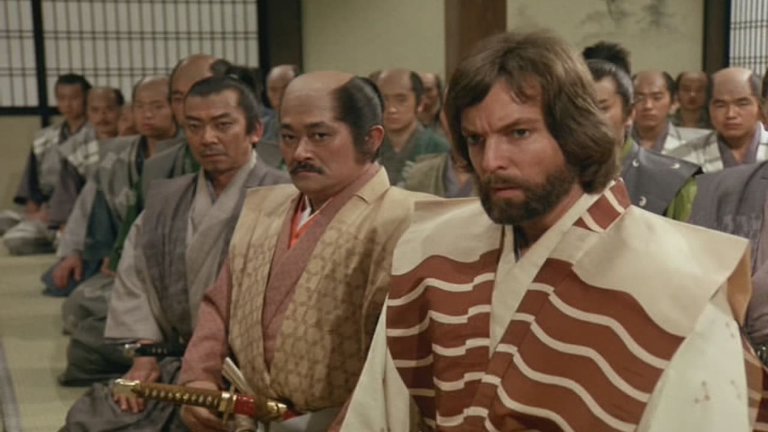
Before the Golden Age of Television there used to be the Golden Age of Miniseries. At least for American broadcast networks, which had recognised the format as perfect for their most prestigious, most expensive and, what often turned out to be the case, most popular projects. Most of such miniseries were adaptation of best-selling novels, those with epic scopes being unsuitable for single feature films. The most successful and most memorable of such adaptations was Shogun, 1980 miniseries based on the eponymous novel by James Clavell.
The novel was inspired by real historical events in early 17th Century Japan, related to William Adams, English sailor who, despite being a foreigner, became samurai in the service of warlord Tokugawa Ieyasu. Protagonist, played by Richard Chamberlain, is John Blackthorne, sailor who serves on Erasmus, Dutch ship sent to explore new trading routes for China, until that time under firm control of Spain and Portugal. Blackthorne manages to find Magellan Passage and sails into Pacific before getting shipwrecked on the coast of Japan. Blackthorne and other survivors are quickly detained by samurais loyal to local warlord Lord Yabu (played by Frankie Sakai). This happens at the moment Japan lacks strong central government and is instead ruled by council of powerful warlords, all vying for position of shogun, de facto ruler of a country. One of those is Yabu’s liege Lord Toranaga (played by Toshiro Mifune), who is intrigued by strange foreigner who happens to be different from Portuguese who, until that time, were the only Europeans to come and trade in Japan. Toranaga recruits Blackthorne into his service, which brings him enmity of Jesuit missionaries who view English Protestant as dangerous heretic and who have managed to convert many powerful warlords to Catholicism. Toranaga orders Lady Mariko (played by Yuki Shimada), beautiful wife of samurai Toda Buntaro (played by Hideo Takamatsu) and Christian convert, to teach Blackthorne Japanese. He not only learns the language, but gradually accepts Japanese culture and becomes loyal servant to Toranaga, while falling in ove with Mariko.
Originally aired in five feature-length parts, Shogun broke viewership records for NBC network and this success was repeated in many other countries. This triumph, further validated with prestigious Emmy and Golden Globe awards, can be explained with the producers treating this miniseries as “larger than life” event that was supposed to rewrite television history. Shogun was first American television series being shot in Japan (with famed Toho studios being put to good use) and also the first television series to push certain content boundaries, which included people being beheaded, boiled alive and urinated on, although shown in mostly implicit ways that wouldn’t create much fuss on network television today. However, the biggest attraction for the viewers was its theme, exotic setting and ability to have some “large than life” experience until that time provided only by big Hollywood epics on the big screen. Produced by the novel’s author and written by Luca Bercovici, Shogun provided very faithful adaptation and explored many interesting subjects like culture clash, loyalty and complex political situation during the latter stages of Sengoku Period. By being based on fiction instead of historical record, this miniseries allowed more freedom for its creators to bring good and effective combination of romance, action and melodrama.
But the best decision was to approach the plot almost exclusively from the perspective of the protagonist, a person who arrives to Japan as a complete stranger and has yet to learn the language or the customs. This is the reason why almost all characters in this miniseries speak only Japanese and their lines of dialogue aren’t subtitled. Viewers who don’t speak Japanese are in the same position as the protagonist and they have to work out what those other persons are, whether they are friends or foe and what they should do about it. This concept works, especially in the first episodes of the series. In case the audience might be too confused, producers use voice over narration provided by Orson Welles to explain what is happening on screen. In most scenes, except one or two, this technique works.
The acting is top notch, with Richard Chamberlain providing another strong performance which would later bring him the nickname “King of Miniseries”. John Rhys-Davies is memorable as Blackthorne’s Portuguese friend Rodrigues, while Toshiro Mifune, veteran of Kurosawa’s films and one of the most charismatic stars of Japanese cinema, elevates this film with his regal presence. Yoko Shimada also gave very good performance despite not being good in English and having to learn all her lines phonetically. High quality of acting is well matched by capable direction of Jerry London and famous composer Maurice Jarre, known for providing music for various Hollywood epics, providing another great score. The plot sags at the end and becomes a little bit too melodramatic, and viewers familiar with Sengoku Period might not like scriptwriters’ oversimplification of those interesting times and characters. But even with such flaws, Shogun can still provide entertainment for viewers who want old fashioned historical epics and its place in television history is still well-deserved.
RATING: 7/10 (++)
Blog in Croatian https://draxblog.com
Blog in English https://draxreview.wordpress.com/
Leofinance blog https://leofinance.io/@drax.leo
Cent profile https://beta.cent.co/@drax
Minds profile https://www.minds.com/drax_rp_nc
Uptrennd profile https://www.uptrennd.com/user/MTYzNA
Hiveonboard: https://hiveonboard.com?ref=drax
Rising Star game: https://www.risingstargame.com?referrer=drax
1Inch: https://1inch.exchange/#/r/0x83823d8CCB74F828148258BB4457642124b1328e
BTC donations: 1EWxiMiP6iiG9rger3NuUSd6HByaxQWafG
ETH donations: 0xB305F144323b99e6f8b1d66f5D7DE78B498C32A7

Thank you for this wonderful review of the movie
But the best decision was to approach the plot almost exclusively from the perspective of the protagonist, a person who arrives to Japan as a complete stranger and has yet to learn the language or the customs. This is the reason why almost most characters in this miniseries speak only Japanese and those lines dialogues aren’t subtitled.
Now i am now interesting in watching the movie after reading this part..